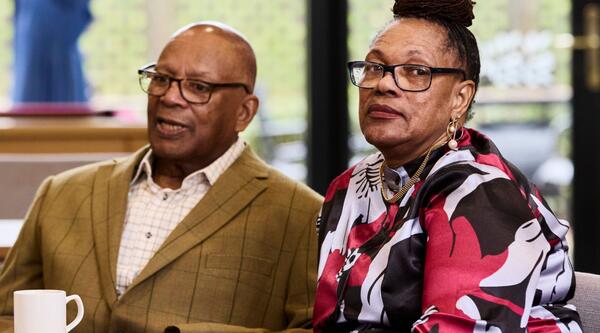Tireless dementia campaigner Barbara Pointon has died
Alzheimer’s Society is sad to hear of the death of Alzheimer’s Society Ambassador Barbara Pointon, MBE.
Alzheimer’s Society is sad to hear of the death of Alzheimer’s Society Ambassador Barbara Pointon, MBE.
Barbara Pointon had been living with dementia for two years, and is best remembered for her crucial lobbying work on behalf of others living with the condition, and those who cared for them.
Barbara Pointon MBE first came to the public’s attention in 1999 when ITV showed a documentary called Malcolm and Barbara: A Love Story, directed by legendary documentary maker Paul Watson. It was the first time that dementia had received that level of prominence on one of the main television channels.
In the observational style documentary, Barbara is shown looking after her husband Malcolm in a brutally honest depiction of dementia. Few people at that time had the courage to show the reality of looking after someone with mid-stage dementia.
In 2004, Barbara won a landmark case arguing that the NHS should fund nursing care at home, not just in a nursing home or hospital. The ombudsman ruled in her favour, with her tireless work proving crucial in paving the way for thousands of others to receive free NHS care at home, called Continuing Health Care (CHC). CHC provides for care that is funded by the NHS and is free at the point of use, unlike most care for people with dementia. This court decision was an important first step in the NHS recognising that people with dementia have needs as a result of their health condition which should be paid for by the state, unlike means-tested social care.
While we have a long way to go to make care truly accessible to people with dementia, it wouldn’t have happened without Barbara’s campaigning.
Barbara became a much sought-after speaker on dementia, because so few people were willing to put themselves forward to talk about the realities of experiencing life with dementia, and the struggles faced by carers. She became a representative of several dementia charities, including as an Ambassador for Alzheimer’s Society, lobbying parliament for greater support of carers. She was awarded an MBE in 2006 for services to the carers of those living with dementia. In 2007, a follow up documentary, Malcolm and Barbara, Love’s Farewell aired on ITV, following the thoughts of Barbara and her family as Malcolm passed away.
Barbara was sadly diagnosed with rapidly progressive dementia, probably Alzheimer's disease more recently – she had been living with the condition for around two years.
At the start of the 2020, Barbara was still physically strong, but she broke her hip in a fall in May 2020. It was a difficult time for Barbara’s family because they had not been able to see their Mum face to face since March, when the lockdown began. The staff did believe that Barbara was making some progress, even though she was losing weight, after her fall. But on Saturday, Barbara began to refuse food. She passed away the next day.
Barbara's son, Chris Pointon, said: 'Mum's warmth, humour, passion, intelligence and courage led her to have a positive impact on so many people. We're devastated to lose her, but we know that the beautiful ripples from her life will continue for a long time.'
Dr Nori Graham, Vice-President for Alzheimer’s Society, said: 'Barbara was absolutely key in the establishment of the right for carers of people living with dementia to receive free NHS care at home. The right to continuing health care funding at home only came about because of Barbara’s relentless fight for it.
'Barbara, a big thank-you for all your courage and everything you achieved for carers.'
'It was a privilege for me to have known and worked with Barbara. I send my sincere sympathy to the family."
Kate Lee, CEO of Alzheimer’s Society said:
'Barbara’s work and tireless campaigning was crucial in bringing the challenges facing people affected by dementia out into the open. Her willingness to share her story on film made a huge impact on the national conversation around dementia, reassuring countless people that they weren’t alone in their experiences.
'Barbara’s case was a landmark in the debate about the right to have some care at home free, helping to ensure the NHS recognises that people should have their needs met in the community.
'We greatly appreciated her support as one of our Ambassadors.'
We are still campaigning today to protect the rights of people with dementia, and we look forward to continuing her legacy and championing the cause for which she so passionately fought. Our thoughts are with her family at this sad time.'






